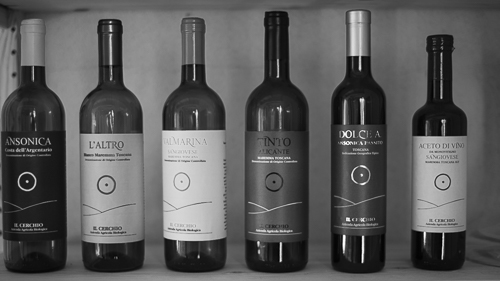
This farm, which is located in the countryside near the town of Capalbio, cultivates grapevines and olive trees in an organic way since they started in 1998 because its owners consider organic farming indispensable, but also satisfying, a necessary choice for assuring a future for agriculture, but also the entire ecosystem. Organic farming requires using only elements like copper and sulphur in order to defend the vineyards and the olive groves against harmful funghi and insects. This way of farming requires a continuous attention in every phase of growth of the grapevines and olive trees.
This farm, which is located in the countryside near the town of Capalbio, cultivates grapevines and olive trees in an organic way since they started in 1998 because its owners consider organic farming indispensable, but also satisfying, a necessary choice for assuring a future for agriculture, but also the entire ecosystem. Organic farming requires using only elements like copper and sulphur in order to defend the vineyards and the olive groves against harmful funghi and insects. This way of farming requires a continuous attention in every phase of growth of the grapevines and olive trees.
The owner of the farm, Corinna Vincenzi, who worked as an architect in Milan, has made organic agriculture a lifestyle together with her late husband and her son. She has graduated as a sommelier, meaning that she has a profound knowledge of wines, but also how to produce them.
The land of this farm is a result of the Land Reform acts in the 1950s where big farms owned by a single family was divided into many small ones with their separate owners.
After having expropriated the great land extensions that, in part, had been left abandoned by the landowners, it was divided up and given to the former sharecroppers in the shape of a piece of land and a house. In return, they should pay a yearly rent to the state by working the land, but many of them weren’t able to do it. By means of various incentives, the lots were cultivated for some decades, but some of them were subsequently abandoned.
Corinna and her husband visited this area for many years during their holidays and gradually they started thinking of moving here. Then, in 1988, they bought a piece of land, which had been part of a landowner’s property, still retaining its original characteristics. However, the land had been abandoned for many years and the work required for making it cultivable was long and arduous. Gradually, by means of getting help from an elderly, local farmer, she came to love this work, arduous, certainly, but also giving lots of satisfaction. A the same, she worked as an architect in Milan, but, in 1992, the whole family moved to this place. The son, Beniamino, grew up in this area, but after having studied at university, he decided to come back and help his mother with the farm.
This farm has 5 hectares of vineyards, of which 3 are in production and 2 are in pre-production, meaning they have been planted recently and are still growing. Moreover, each field has its own unique type of grapevine.
- Ansonica, originally from the Middle East and cultivated for centuries in Sicily and brought to the island of Giglio and the coast of Argentario in the 16th century.
Vermentino
Sangiovese
Alicante, which arrived from Spain in te 16th century
Prugnitello
Ciliegiolo
The two last ones were planted a few years ago. In general, grapevines start gradually producing when they are 3-4 years old, but it requires at least 7-8 years before they are producing fully. The grapes are harvested manually.
- This farm makes the following wines:
Ansonica Costa dell’Argentario DOC
L’Altro IGT
Valmarina IGT
Tinto IGT
and one type of vinegar: Aceto di Vino IGT
This farm has all the required equipment for making both re and white wine: de-stemming, wine press, tanks and barrels. The olives are sent to a nearby olive press called Terre di Maremma.
All the products of this farm are certified by the Institute for Ethical and Environmental Certification (ICEA) , one of the best certifying bodies in Italy recognised by the EU and the Italian Association for Organic Farming (AIAB) , which is widely recognised abroad.
